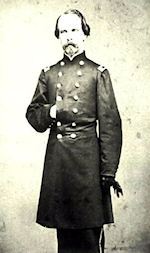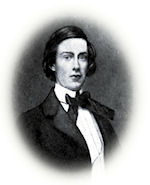
13th.—The Regiment received two months’ pay to-day, and to-night are all busy as bees making up express packages, to be sent to fathers, mothers, sisters, sweethearts and wives. To-morrow, all who can get passes to go, will be in Washington buying presents and sitting before a camera to “stain the glass” with reflections from their faces, all to be sent to friends at home. As man, in the mass, can be, in no condition, however bright, which will exempt him from cares, fears and apprehensions, so there is none so dark as to exclude hopes and anticipations of better things. Even here we have our joys and our aspirations, and these are of them. We preach that man should study to be contented. What! man in his imperfect condition, contented, that he, as an individual, or as a part of a great whole, should remain forever, as he is! It is opposed to all God’s plans. Discontent is the only stairway to progress. Through the discontent of Israel, Egyptian bondage was broken. The discontent of Russia brought war, which more than compensated for its ravages and its horrors, by the introduction of her people to a knowledge of liberal ideas. Czarism was shaken, and already the Goddess of Liberty waves her cap over the downfall of serfdom. The seceder’s discontent in England was the Genesis of a mighty nation. Elijah cast off the cloak, too small for his growing aspirations, whilst his followers eagerly grasped its folds to aid their progression. The discontent of an Almighty God substituted Noah for Adam— Christ for Diana—Eternity for Time. And is the discontent which occasioned this great war, with all its horrors, its butcheries, its temporary demoralization, to have no great result? Is it a bare interlude of the parties engaged, taking advantage of the time when “God sleepeth;” or is it a spark emitted from the great restless spirit of Jehovah, destined to ignite into a “pillar of fire,” and to light us on in the journey of universal progress?
“Hope springs eternal—”
I have to-day seen a “speck of war,” with another touch of Vandalism. I have, for the first time, seen an army in drill. Fifteen to twenty thousand men, a thousand horses, and one hundred artillery wagons, on parade. To me, who had never seen anything of the kind, it was grand, and looked like war. I note here an extract of a letter written to a friend to-day, attempting a description of part of it: “It was, indeed, a magnificent sight, to see six hundred horses harnessed to a hundred wagons, in full run, in line, like a regiment of infantry, and at a word of command, to become so instantly and inconcievably mixed that you would think a universal smash inevitable, appear in another instant dashing across the vast plain without a wagon attached. Turn your eyes to see the wrecks, and you will be surprised to see the carriages in four straight lines, forming a hollow square, with the mouth of every gun pointing outwardly, and a laughing expression of “Surround me if you dare!” Another look will show you that the carriages are so close together that the horses can not pass between them, yet the wagon poles to which the horses had been hitched are all inside of the square. How did the six hundred horses get out? The cannon at once open their hundred mouths and are enveloped in smoke. The horses return, disappear for a moment in the dense smoke, and seemingly without their stopping long enough to be hitched to, the four lines straighten out into column, and the cavalcade is again dashing across the plain. In less than forty rods, the jumble is repeated, the square formed, the horses gone, and the hundred cannons again open. When did they reload?” The vandalism: The finest orchard I have seen in Virginia, was cut down today, and in one hour converted into a brush-heap; and for no other purpose than to give the infantry a chance to “show off” in an hour’s parade. The fruit trees were in the way, and were cut down! It will take forty years to replace that orchard.








